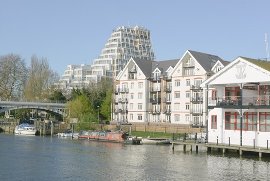Kingston Heights Flats
NHP Leisure Developments Ltd acquired the former Kingston Power Station site in Kingston upon Thames in 1999 from Powergen, which had applied for planning permission to build a residential and hotel scheme there. Mike Spenser-Morris of NHP Leisure Developments said, "I knew that heat pumps were the most efficient way of producing thermal energy and it occurred to me that there was plenty of water in the Thames that was easily accessible".
The new Kingston Heights £70m mixed use development will save over 500 tonnes of carbon a year by using water source heat pumps instead of burning biomass in a CHP plant to keep 137 flats warm in winter. The system will also heat a new 142 bedroom hotel in winter and recycle the heat recovered from providing cooling in summer.
The Open Water Heat Pump system works by recovering the solar energy stored naturally in the river water. Up to 150 litres of water a second is abstracted after passing through a two-stage filtration process. The water then passes through high-efficiency heat exchangers to harvest the low grade heat before being returned to the river with a temperature change of no more than 3°C.

It is estimated that the system cost 15% more than the equivalent biomass boiler heating scheme and that the heat supplied will cost 15% less. The system also provides cooling to the hotel and recycles the heat from cooling to heat hot water for showers.
The Energy Secretary has described the development as "game changing" in relation to Britain's need for renewable energy against the backdrop of insecurity in Russia, which supplies much of Europe's gas, and the political row at home over soaring fuel bills.
The minister has asked officials at DECC to draw up a water source heat map to show where renewable heat can be drawn from water to exploit the potential of heat pumps. Any large body of water, including tidal rivers as well as standing water can be used. The Government has a target of 4.5 million heat pumps across Britain. Sir David MacKay, the chief scientific adviser to DECC and professor of engineering at Cambridge, has described a combination of heat pumps and low carbon electricity as the future of building heating.
Water source heat pumps benefit from the thermal inertia of river water
A heat pump can concentrate heat by compressing refrigerant gases into a small volume and then transfer the heat into buildings to provide warmth via heat exchangers. The refrigerant gas becomes cold when the pressure is released and this coldness can be exchanged with warmer water from the river – and the cycle can be repeated continuously. The effect is to transfer heat from the river into the building to heat the flats.
Some interesting points to note:
- heat pumps are likely to become more common as the UK attempts to decarbonise its heating systems
- the use of heat pumps is growing as the government subsidises low-carbon heat sources with the Renewable Heat Incentive
- air source heat pumps, which heat exchange with ambient air, are cheaper to install than ground source heat pumps, but they are at their least efficient on the coldest days when they are most needed.
- The river is warmer than the air in winter, so a water source heat pump is more efficient than an air source heat pump – because of the thermal inertia of the water from the previous summer.
- The ground is also warmer than the air, so a ground source heat pump is also more efficient than an air source heat pump – because of the thermal inertia of the ground from the previous summer.
It is possible to go one major step further in exploiting the thermal inertia of the immoveable thermal mass of the ground – by adding solar heat to the ground in summer in order to recycle the heat with a heat pump the following winter: Underground Thermal Energy Storage.
Heat pumps can play an important role in balancing supply and demand

It has been said that: "Heat pumps could also play an important role in balancing supply and demand in future energy systems. Electricity is difficult to store, but heat can be stored easily in the form of hot water."
In fact, heat pumps will be able to play a far more significant part when it is understood that heat pumps can do much more than store a small amount of heat overnight in small hot water tanks: heat pumps can play a significant part in interseasonal heat transfer systems when the ground itself can be used as a very large store of solar heat energy from summer to winter.
ICAX District Heating Networks
ICAX is involved in the design and installation of the following district heating schemes based on heat pumps:
- Balanced Energy Network: an open loop aquifer system at London South Bank University
- Community Heating Southwark: a set of open loop aquifer systems in Southwark
- Owen Square District Heating: a closed loop system at Easton, Bristol, including summer recharge.
See Ground Source Heating Ground Source Cooling Ground Source Energy



